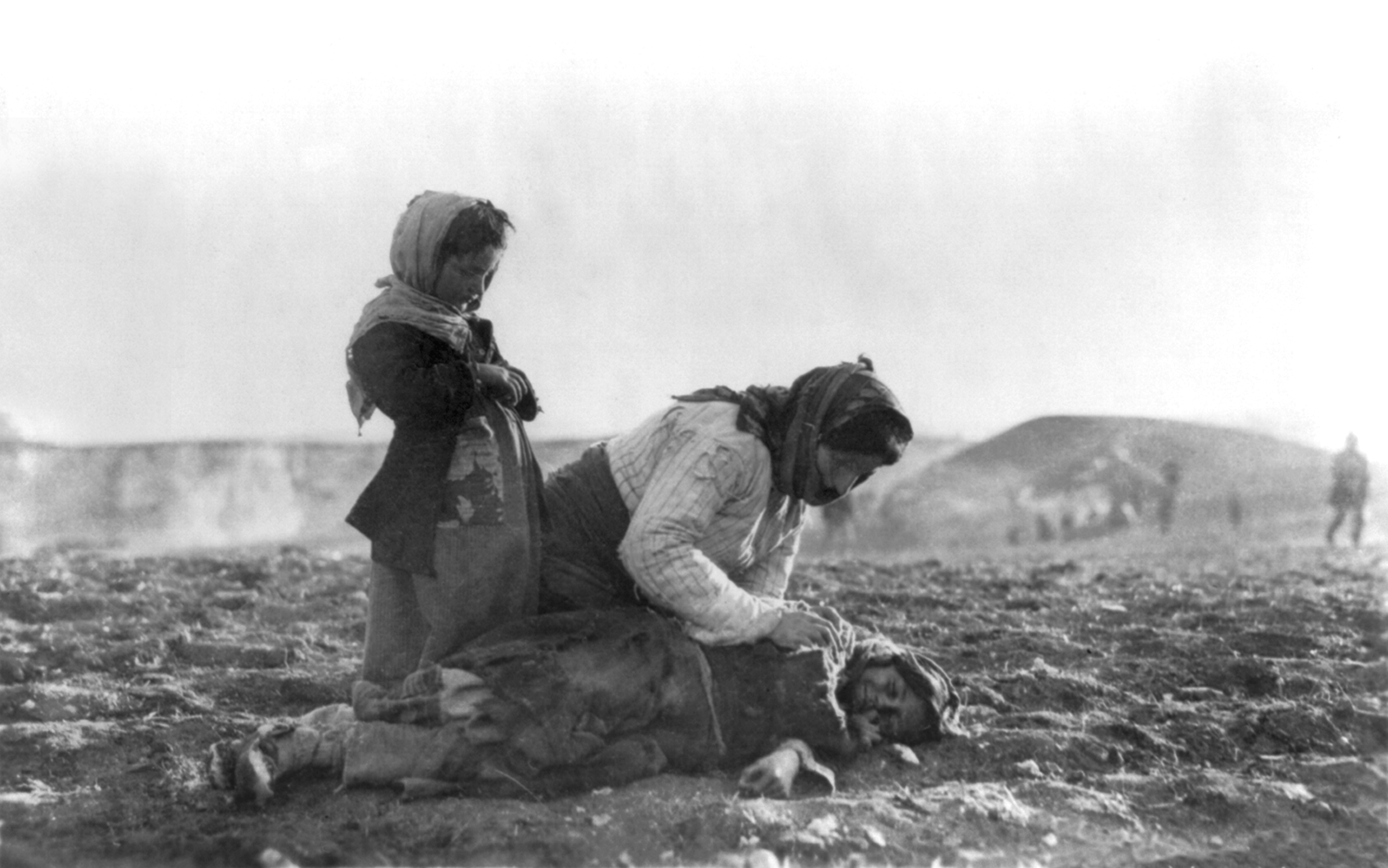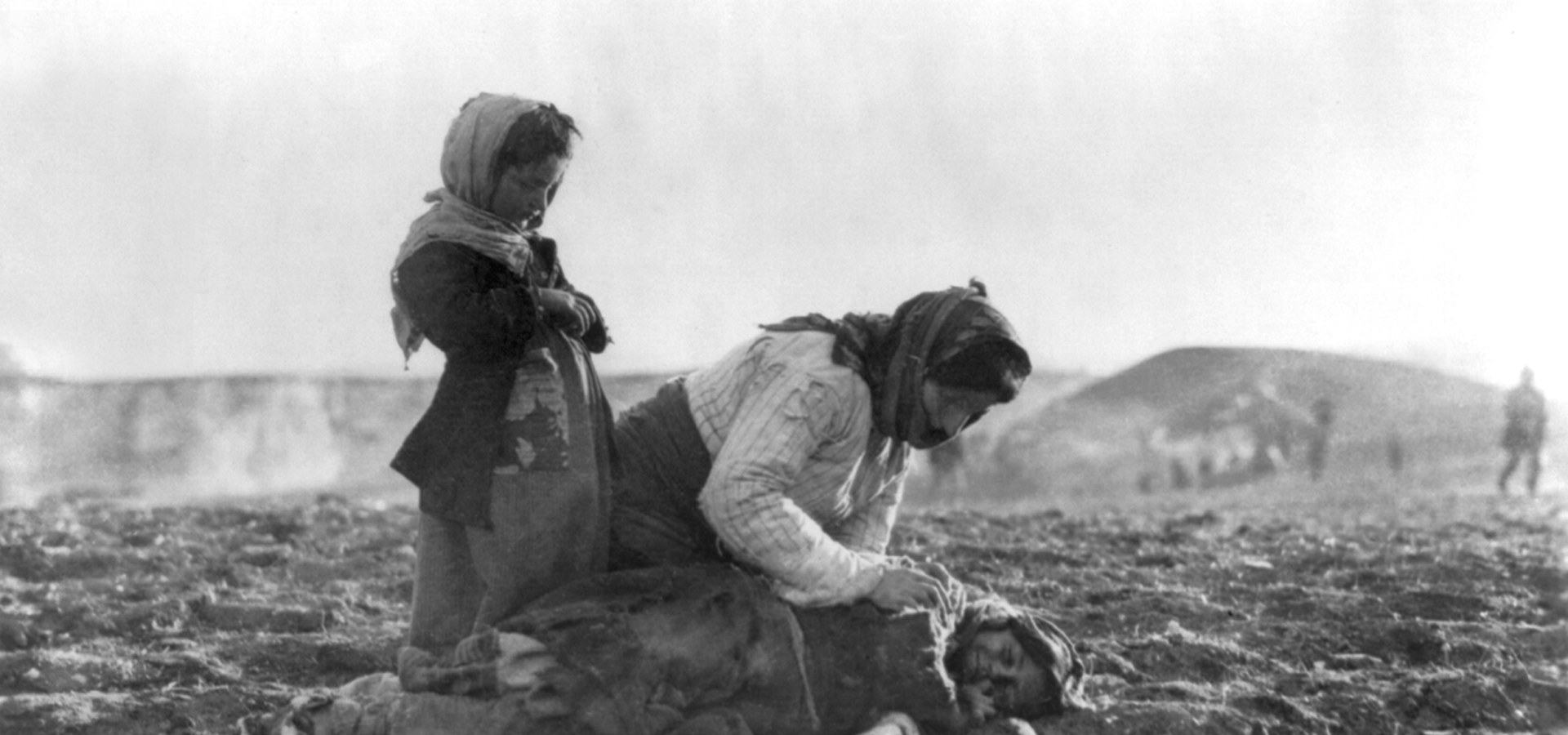 An Armenian woman kneeling beside a dead child in field “within sight of help and safety at Aleppo”, an Ottoman city.
An Armenian woman kneeling beside a dead child in field “within sight of help and safety at Aleppo”, an Ottoman city.
The recent passing of the 100th anniversary of the Armenian genocide is a reminder that not all tragedies are counted the same, and that politics, both at home and abroad, can color our interpretation of history.
In modern Turkey, mention of the genocide is politically unpopular both inside and outside of government. Although officials today admit that atrocities took place, Turkish officialdom insists they were neither planned nor systematically coordinated so as to eradicate the Armenian population. Meanwhile, the vast majority of Turks agree that their country should not label what happened to its Armenian population in 1915 a genocide nor apologize for it.
Such are feelings on the matter in the Republic of Turkey that states wishing to do business with Ankara are well advised to avoid mentioning the “G”-word. Here in the United States, for instance, President Obama pointedly avoided calling the killing of 1.5 million Armenians a genocide even though there was some debate on the issue inside the White House. Instead, he used the term “great calamity,” which sounds like 1.5 million people were killed by accident via happenstance — they were simply in the wrong place at the wrong time, so to speak.
Even U.N. Secretary-General Ban Ki-moon, not usually one to sound tougher on an issue, used the slightly more descriptive term “atrocity crimes” to describe the genocide.
Israel, which has tried hard to maintain good relations with Turkey in order to balance against its generally unfriendly neighbors, has also tread lightly when it comes to calling a genocidal spade a spade. Officially, Israel, like many more powerful countries, neither recognizes nor denies the Armenian genocide. And although though the Knesset has a debate on the issue every year, the body does not seem likely to change its position any time soon. Given that the founding of the State of Israel was in no small part due to the perpetration of a similar crime against European Jews, Israeli ambivalence on the subject is perhaps the most poignant reminder that national interests nearly always trump historical fact when said facts are entirely too inconvenient.
Other crimes, other times, other places
This tendency to avoid calling something what it is doesn’t just apply after the fact, either. During the Rwandan genocide, for instance, the White House told officials to avoid the use of the “G”-word during that mass slaughter in central Africa and use the euphemism “acts of genocide” instead, although just how many acts were required before a genocide could be labeled as such wasn’t something the Clinton administration was willing to say.
Lest one think this is a problem that only Democratic presidents have, during the Bush years there was also resistance to using the term to describe the goings-on in Sudan’s Darfur region until then-Secretary of State Colin Powell decided to finally call it out as such in 2004.
So, in the recent past, we have three examples of when a genocide is a genocide and when it is something different. Are there others? During the savage little Balkan wars in the 1990s and early 2000s, for instance, the term “ethnic cleansing” was more commonly used, given that atrocities were used to clear unwanted elements from certain territories rather than to eliminate a population entirely. What difference that made to the people on the ground seems rather academic, however. Likewise with the Kurds in Iraq during the 1980s, although when Saddam Hussein finally became an enemy of the U.S. after the 1990s we were quick to pin that label on Baghdad’s actions, too.
Curiously, that tends to be the case with a lot of massacres. When Cambodians were slaughtered by the hundreds of thousands by the half-mad Pol Pot and his merry band of Khmer Rouge killers — that was deemed genocide. On the other hand, when Indonesia invaded and occupied East Timor and slaughtered as much of its population as it could, that was something different, as was Jakarta’s earlier mass killing of political opponents in 1965-66. Same, too, in Central America during the 1980s, when peasants and Indians were massacred on a grand scale by right-wing regimes in Guatemala and El Salvador.
Truth is always the first casualty
This tendency to call politically inconvenient violence something other than what it happens to be is endemic to politics, regardless of who is doing the killing or trying to justify or ignore it. All countries do it, and it stems from a basic form of motivated reasoning that is simply part of human psychology. Put very simply: We ascribe good motivations and actions to our own actions and those of our friends, and bad motivations and actions to those who are our adversaries. Thus, a massacre can be termed genocide in one country, an atrocity in another, or something barely worth mentioning in a third. The truth of a given event, as always when it comes to politics, is usually a matter of perspective, regardless of how many people are actually killed.
Understanding this tendency should therefore be front and center when thinking of these grim events as well as the politics that lead up to them. We must accept, no matter how hard it is, that we are not always the “good guys” in our own story. And, indeed, it takes brutal honesty to admit when one’s own country has committed terrible sins in the name of domestic politics or international advantage. After all, no one wants to play the villain, least of all those who have so much to gain, both materially and psychologically, from being the good guy.
So, when you turn on the evening news or read about some terrible conflict in some faraway place, understand that you’re receiving at best an incomplete picture and that we quite often see what we want to believe. This is especially the case when reports from our own media come in about atrocities committed by our adversaries and crimes committed by our own government and allies. Our media almost inevitably plays up reports of the first kind, but downplays the actions of the second.
Being cynical about one’s own side may not make one popular, as those Turks who accept the reality of the Armenian genocide can no doubt attest, but it puts one far closer to the truth that most would readily admit.


